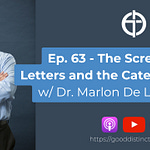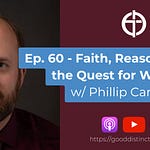NOTE: THIS EPISODE WAS PUBLISHED BEFORE OUR REBOOT. willwrightcatholic.com is now gooddistinctions.com
The Last Two Weeks
Over the last two weeks, we have explored two distinct but related topics: first: judging actions, not people, and second: how ideology can come at the expense of charity and kindness. Those topics are foundational for any conversation on forgiveness. So, if you have not read or listened to those, I highly recommend going back and viewing those first!
To Err is Human, to Forgive, Divine
Alexander Pope, in his poem An Essay on Criticism written in 1711, says, “To err is human, to forgive divine.” This comes from an old Latin proverb errare humanum est (to err is human). Erring is easy. We do it all the time. We make silly mistakes and sometimes we make big mistakes. We can be selfish, careless, ignorant, or down-right malicious.
Every human being sins and falls short of the glory of God (cf. Rom. 3:23). We all need forgiveness. Why then is it so darn hard to forgive sometimes? Maybe we are waiting for the apology that never comes. Maybe we have tried to make things right but it falls on deaf ears.
Given our fallen world, it seems that forgiveness is just out of reach, a lot of the time. This is why Alexander Pope says that forgiveness is divine. Do we need the omnipotence of Almighty God to muster up forgiveness? Or perhaps, paradoxically, we need to emulate the sublime humility of God to forgive others?
Do We Need to Forgive? - Natural Order
Is it necessary to forgive? Do we need to forgive? If it is so difficult, perhaps it would be easier to forgo the exercise and just move on? The problem with this is that resentment can build. Forgiveness is important for our physical and mental well-being. As the Catholic author Bert Ghezzi puts it in his 1980 book The Angry Christian,
“Resentment is like a poison we carry around inside us with the hope that when we get the chance we can deposit it where it will harm another who has injured us. The fact is that we carry this poison at extreme risk to ourselves.”
Phrased another way: unforgiveness and resentment is like drinking poison and expecting the other person to die. If we do not let go, this resentment will kill us.
Before you get too deep into resentment, remember that most people err out of ignorance. Malice certainly exists. People do bad things out of malevolence; it would be naive to think otherwise. But it would be a mistake to assume malice. Instead, apply “Hanlon’s razor” - “never attribute to malice that which is adequately explained by stupidity.” I am not suggesting we assume everyone is stupid. Remember to judge actions and words, not people. However, it is far more charitable to assume someone is acting out of misguided passion or ignorance rather than malice.
Do We Need to Forgive? - Supernatural Order
What about in the supernatural order, spiritually-speaking? Our Lord Jesus lays it all out on the line for us:
“For if you forgive others their trespasses, your heavenly Father will also forgive you, but if you do not forgive others their trespasses, neither will your Father forgive your trespasses (Mt. 6:14-15).”
We are all sinners in need of God’s forgiveness. Accordingly, it is not only a good idea to forgive; it is absolutely necessary for salvation. Our Blessed Lord shows us also in the Gospel of St. Mark that,
“whenever you stand praying, forgive, if you have anything against anyone, so that your Father also who is in heaven may forgive you your trespasses (Mk. 11:25).”
Our forgiveness of others is plainly concomitant with the forgiveness that we receive from God. Jesus Himself teaches us to pray to the Father with these words, Father: “... forgive us our debts, as we also have forgiven our debtors (Mt. 6:12).” Hearing this alongside the other two passages calling for us to be forgiving, the necessity is clear. But Jesus makes it even clearer in St. Matthew’s Gospel right after giving us the Our Father prayer. He says,
“For if you forgive others their trespasses, your heavenly Father will also forgive you, but if you do not forgive others their trespasses, neither will your Father forgive your trespasses (Mt. 6:14-15).”
The call to forgiveness is so important that it needs to be put forcefully and plainly. If you and I do not forgive others, we will go to Hell. The call is that simple. This act, however, is not simple; in fact, it is impossible for man. But with God, all things are possible. He gives us the grace in His Holy Spirit and through the merits of His Cross.
Forgiving Even Our Enemies
Forgiveness is one of the most powerful acts of love. It is requisite, if we are to love. This is all well and good when the person who needs to be forgiven is a friend, family member, or acquaintance, but what about when the person is our enemy? Jesus says at the end of the Sermon on the Mount:
“43 You have heard that it was said, ‘You shall love your neighbor and hate your enemy.’ 44 But I say to you, Love your enemies and pray for those who persecute you, 45 so that you may be sons of your Father who is in heaven. For he makes his sun rise on the evil and on the good, and sends rain on the just and on the unjust. 46 For if you love those who love you, what reward do you have? Do not even the tax collectors do the same? 47 And if you greet only your brothers, what more are you doing than others? Do not even the Gentiles do the same? 48 You therefore must be perfect, as your heavenly Father is perfect (Mt. 5:43-48).”
For a brief reflection on this last line about perfection, check out “The Perfect is the Enemy of the Good” from a couple weeks back, here on Will Wright Catholic!
We must love even our enemies and this means forgiving them.
Radical Forgiveness, In Christ
One of the most poignant examples in recent memory comes from Corrie Ten Bloom. She was a Dutch woman who was arrested by the Nazis for hiding Jews. She survived countless horrors in the Ravensbrück concentration camp. Later, in 1947, in a church in Munich, she saw one of the vicious guards of Ravensbrück. Since the war, this vile man had become a Christian. After her talk, he approached her and asked her for forgiveness. By the power of Jesus, Corrie Ten Bloom did forgive that Nazi guard. This is the strength God gives us to overcome anger, if we only ask.
It would have been easy for Corrie Ten Bloom to give into hatred of this guard who had caused her so much suffering. It would have been easy for her to curse the man and walk away. A compelling argument could even be made that he would have deserved to be treated like dirt.
She describes this moment, frozen before the former guard, as one of the most difficult things she has ever had to do. She cried out in the silence of her heart to Christ saying, “Jesus, help me! I can lift my hand. I can do that much. You supply the feeling.” Of course, Jesus answered. He desired for forgiveness to win the day, as it always does.
She put out her hand describing being filled with a “healing warmth.” Tears came to her eyes and she said, “I forgive you, brother. With all my heart.” The love of God has a power that cannot be explained in words. This forgiveness is impossible for man, but with God all things are possible.
This radical love and forgiveness is only possible with Jesus Christ. He Himself said, “Father, forgive them” of the Romans while suffering His agonizing passion and death.
Are We Forgiven?
Okay. We can forgive our friends, family members, and acquaintances, and even our enemies. But, what about forgiving ourselves? Sometimes the hardest person to forgive stares back at us in the mirror each morning.
Again, the only way to truly forgive ourselves is to love ourselves. To get to this point of humility, we have to see ourselves how God sees us. We need to deeply experience His love, mercy, and forgiveness. You might be thinking: that’s fine for other people, but I’m pretty awful. I mean, I suck. Well… first of all, shush. No you don’t. In the future, we are going to talk about the difference between conviction and condemnation. Suffice it to say, the former is a gift from God and the latter is from the pits of Hell.
What does God reveal to us about His merciful forgiveness? Above all, He showed us the depths of His love from the Cross. Jesus Christ is sinless and blameless, but for our sake, for our sins, He endured the weight of the Cross. He suffered, died, and rose so that we might be forgiven. We share in His merits because He made us coheirs with Him through Baptism. What a gift!
God Alone Blots Out Our Transgressions
God alone can forgive sins. Furthermore, we need Him to see our faults clearly. As the Psalmist says, “Who can discern his errors? Declare me innocent from hidden faults (Ps. 19:12).” As an aside, this is why I end my confession in the Sacrament of Penance with some iteration of: “and for all the other sins I have forgotten, I am sorry.” I am not saying this to “cover my bases;” I am giving thanks to God for declaring me innocent from hidden faults.
Only when we receive God’s love and mercy with an open heart will we be truly happy. As the Psalmist says, “Blessed is the one whose transgression is forgiven, whose sin is covered (Ps. 32:1).”
How do we become so fortunate? How do we receive this divine forgiveness?!? Simple: we ask. As Pope Francis says rightly and so often: “God never tires of forgiving us.” We need only ask for His forgiveness with a contrite heart. Then, we receive the promise of Jeremiah: “I will cleanse them from all the guilt of their sin against me, and I will forgive all the guilt of their sin and rebellion against me (Jer. 33:8).”
Further, by a true miracle, it is as if our sins did not exist. To illustrate the point, God speaks through the Prophet Isaiah saying, “I, I am he who blots out your transgressions for my own sake, and I will not remember your sins (Is. 43:25).” The Psalmist echoes the same joyous song: “as far as the east is from the west, so far does he remove our transgressions from us (Ps. 103:12).”
When and How Many Times Must We Forgive?
It is clear that God forgives us when we are contrite and ask for His forgiveness. He never tires of forgiving us. Every single time you or I commit the same sin that we confessed last time. Every time we find new ways to offend the Lord. He does not stop His mercy. As long as we have breath in our lungs, we can receive His forgiveness.
What, then, should our response to this gratuitous mercy be? It should be gratitude, first. What a beautiful gift to continually be drawn back to our Heavenly Father by our Lord Jesus Christ in the power of the Holy Spirit, the Paraclete. Second, we should do likewise.
In the Gospel of St. Luke, Jesus says this:
“Pay attention to yourselves! If your brother sins, rebuke him, and if he repents, forgive him, and if he sins against you seven times in the day, and turns to you seven times, saying, ‘I repent,’ you must forgive him (Lk. 17:3-4).”
Likewise, in St. Matthew’s Gospel, Jesus is asked by St. Peter: “Lord, how often will my brother sin against me, and I forgive him? As many as seven times?” Jesus replies, “I do not say to you seven times, but seventy-seven times (Mt.18:21-22).” Here, Jesus is not saying that we forgive seventy-seven times but to heck with them on the seventy-eighth time. It simply means an uncertain and inscrutable number - as many times as it takes.
This is not an excuse to sin, nor is it a free pass for the offender. Right before this passage Jesus says to His disciples:
“Tempations to sin are sure to come, but woe to the one through whom they come! It would be better for him if a millstone were hung around his neck and he were cast into the sea than that he should cause one of these little ones to sin. Pay attention to yourselves… (Lk. 17:1-2,3a).”
But when someone does offend us, in sin, but then asks for our forgiveness, who are we to deny them? We cannot judge people. We judge actions. We can judge rightly that an action against us was immoral or imprudent, but we cannot judge the offender’s heart and soul. So, following the command of Jesus, we forgive - as many times as it takes.














Share this post